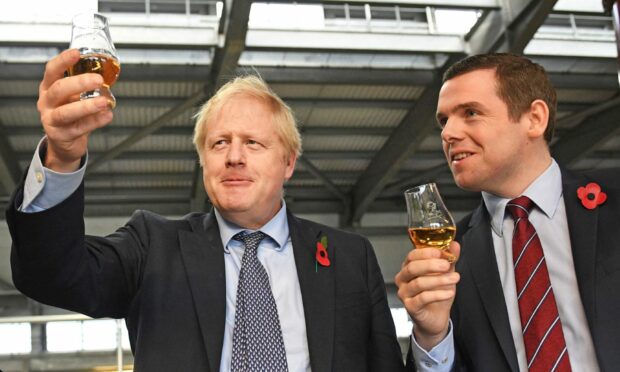Scots have slated the Conservative government as “extremely unlikely” to uphold standards in public life.
Research into public attitudes shows voters north of the border are least likely in the UK to believe Boris Johnson’s administration meets expectations such as integrity, honesty and accountability.
We can reveal the damaging snapshot after a backlash at images of “parties” during lockdown, and apparent breaches of social distancing rules.
The prime minister is also suffering in the polls and saw his party hammered at a recent by-election in Shropshire.
Interviews of around 10,000 people, including every Westminster constituency in Scotland, showed the level of anger.
The study was commissioned by 38 Degrees and carried out by polling company Survation.
The findings represent a fresh blow to the Tories, emerging just 24 hours after a different survey by Opinium for the Sunday Mail showed just 18% said they trusted the Mr Johnson, with 77% believing he lied over Covid-19 rule breaking.
Sleaze and scandal
The Survation study, which we can reveal today, captures opinion in November and after the sleaze and party scandals in December.
People were asked to think about seven themes in public life, known as the “Nolan principles”.
They measure objectivity, accountability, leadership, openness, selflessness, integrity and honesty.
Of the 50 UK constituencies least likely to believe the government upholds those principles, 47 are in Scotland.
At a local level, the worst score was in East Dunbartonshire, followed closely by Caithness, Sutherland and Easter Ross, and by Na h-Eileanan an Iar (Western Isles).
Across the UK, each measure for the seven principles scored more than 50% negative.
Honesty recorded the lowest score with 65% of respondents on average saying the “current government” does not uphold that principle.
Scotland was rock bottom for expectation, with a gap before the scores improved in north west England.
The West Midlands had the most favourable response on average.
But that region’s collective view still levelled out at “somewhat unlikely” to uphold the principles.
In another alarming snapshot for the Tory leadership, the research suggests Labour leader Keir Starmer has higher ratings.
Research of voting intention carried out at the same time suggests the Tories have their lowest share since Mr Johnson took over at 10 Downing Street.
A Survation poll this month put the Tories on 32% and Labour on 39%.
Tougher line for Scottish Tories
Researchers at Survation said Scottish respondents are able to frame their views against the devolved administration for a reference point, as in Wales.
This could explain why Scottish Tory leader Douglas Ross adopted a stronger line against Mr Johnson when stories about parties at Downing St emerged.
Earlier this month, Mr Ross said the prime minister should quit if it he misled parliament over lockdown Christmas party claims.
But Conservative figures will be worried the research shows older voters – considered to be the core support – are more likely to say the government is not living up to the seven principles.
Asked to respond to the research, A party spokesman said: “The Scottish Conservatives support the Nolan principles of selflessness, integrity, openness, objectivity, accountability, honesty and leadership.
“We are Scotland’s real alternative to the SNP and the only party strong enough to challenge the nationalists all over Scotland, as we demonstrated in this year’s election by winning 100,000 more votes than ever before and being the only pro-UK party to move forward.”
How would it translate at an election?
Those scores were then used in wider research, known as MRP, about attitudes at constituency level.
Combined with more date from the Office for National Statistics and the census, it reveals more problems in store for Conservatives under Mr Johnson.
Under the model, and in an immediate election, all six Tory MPs in Scotland would lose their seats.
The splintering of support around a Conservative candidate could benefit other parties.
The research suggests the Lib Dems would lose North East Fife, Edinburgh West, and Caithness, Sutherland and Easter Ross to the SNP.
Labour would pick up Edinburgh East but lose Edinburgh South.

